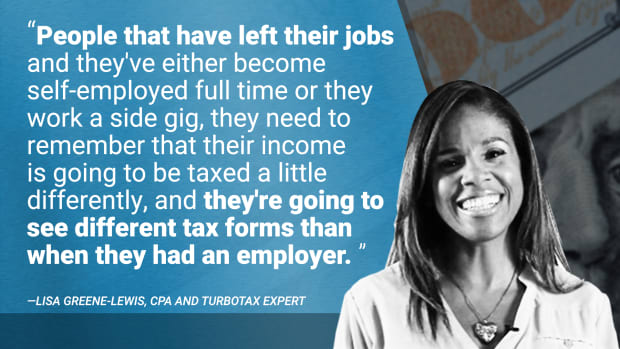The global pandemic complicated our lives and it will complicate our taxes as we head into the 2022 tax season.
Americans received about $6 trillion dollars in pandemic relief. The rescue plan administered under the tax code has provided relief that has come in various ways including stimulus checks and 2021’s Child Tax Credit (CTC).
Our lifestyles have changed, too. A growing number of Americans are now working from home, while others have chosen to leave their jobs altogether.
What impact will all of this have on the 2022 tax season? TheStreet has partnered with TurboTax, a leading tax advisor, to get the answers.
In the video above, Lisa Greene-Lewis, a certified public account (CPA) and TurboTax expert answers
Can employees claim their home as a tax deduction?Can self-employed claim their home as a tax deduction?What deductions can self-employed claim? If I quit my job, what deductions can I take?What stock and crypto transactions are taxable?For information on the third coronavirus relief package, visit TurboTax’s “American Rescue Plan: What Does it Mean for You and a Third Stimulus Check” blog post.
Quotes | Here’s How the Pandemic Impacts Your TaxesFull Video Transcript Below:Tracy Byrnes: So this global pandemic has affected so many areas of our lives, but in particular, it will affect your tax returns. So there’s a bunch of things that you just need to think about as you’re starting to put your files together, as you’re starting to speak to your accountant, as you’re potentially prepping to use an online tax service. Lisa Greene-Lewis, CPA and TurboTax expert, is here with us right now. Lisa, there were some huge trends last year. The biggest was that people are still working from home. What do they need to know?
Lisa Greene-Lewis: Yes, we are still hearing this question about, are my home expenses are deductible. And one thing that people need to remember is unless you’re self-employed, you cannot deduct your home expenses, unfortunately. Under tax reform, everything changed and unreimbursed employee expenses are no longer deductible. Right, and then if you are self-employed, you need to remember that your office, has to be a dedicated space in your home. So it can’t be, you know, that you work at your kitchen table where everybody eats, and your kids do homework. You have to have a dedicated space.
Tracy Byrnes: But those of us that are employed by other companies who have offices somewhere else, even though they’re very dusty because we haven’t been there, you cannot take home office deduction. This great resignation is a thing, it’s a movement. People are resigning from their jobs, you know, really top level. What do they need to be thinking about when they start to sit down and prep their tax return?
Lisa Greene-Lewis: Yeah, so people that have left their jobs and they’ve either become self-employed full time or they work a side gig, they need to remember that their income is going to be taxed a little differently, and they’re going to see different tax forms than when they had an employer. When you’re self-employed, first of all, you don’t have taxes taken out on a regular basis, you know, as a withholding. So if you think you’re going to owe $1,000 or more, you need to pay estimated taxes. But then on the flip side, there are a lot of deductions that you can take when you’re self-employed as long as they’re directly related to your business. So expenses like, you know, computer equipment or if you designed a website for your business, or office furniture and things for your office, remember that those things can be deductible and really help your tax situation.
Tracy Byrnes: For sure, health care as well. People need to be aware of that. The stock market, despite the pandemic, has kind of been on fire. So people have potentially a lot of gains. Crypto’s been moving. I mean, you need, you know, Dramamine to follow it, but it has been moving. So there might be capital gains there too. So what do people need to be thinking about?
Lisa Greene-Lewis: Yes, so I know there’s a lot of new investors out there. The first thing they need to think about, I mean, I often hear the question people don’t even know when their transactions are taxable. So they need to think about, you don’t have a taxable event until you sell your stock or crypto. Also, depending on how long you hold your stocks before you sell them, that’s also how you’re taxed. If you hold your stock or crypto for over a year, then you have the benefit of those long-term capital gains, which are less, you know, you’re taxed less. And then also remember if you had any losing stock or any crypto losses when you sold, which a lot of people are not having. But if you did, you can offset your gains with those losses. And then your losses can carry over to your ordinary income like, you know, your W-2 income or self-employment income, and that’s up to $3,000.
Tracy Byrnes: So I’m getting my investments together, and crypto, in particular, starts to get so confusing because people are trading in and out of it. How do I even keep track of this with my tax return?
Lisa Greene-Lewis: So we have TurboTax Premier, and it really gets after one of the biggest pay points that investors have. We are able to directly import your stop transactions and your crypto transactions from these financial institutions and crypto platforms. So we can directly import up to 4,000 cryptocurrency transactions and 10,000 stock transactions at once.
Tracy Byrnes: Lisa Greene-Lewis, CPA and TurboTax expert, thank you so much for clearing this up.
Editor’s note: Video produced by TheStreet’s Zach Faulds
